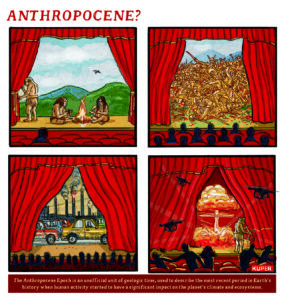Flat Denial Rejects ‘Very Likely’ Science
Mounting scientific evidence that natural causes cannot explain climate change continues to meet unyielding resistance from those who do not accept the facts.
By Tim Radford, Climate News NetworkThis piece first appeared at Climate News Network.
LONDON — The odds that global warming of almost 1°C since 1880 is just a natural fluctuation are very low: less than one in a hundred and probably less than one in a thousand, according to a study in the journal Climate Dynamics.
Shaun Lovejoy of McGill University in Canada didn’t play with computer simulations: he simply looked at the climate data since 1500 and subjected it to statistical analysis. The message from the historical data – records, tree rings, ice cores, lake sediments and so on – is that global warming is linked to fossil fuel-burning and to rising levels of greenhouse gases in the atmosphere.
“This study will be a blow to any remaining climate change deniers,” said the physicist. “Their two most convincing arguments – that the warming is natural in origin, and that the computer models are wrong – are either directly contradicted by this analysis, or simply do not apply to it.”
Lovejoy’s finding is unlikely to be the end of the story, perhaps because there are problems with words like “probability”. David Budescu of Fordham University in the US reports in Nature Climate Change that when people hear the words “very likely” used to describe a 95% chance that something is the case, they are more likely to interpret that as around 50% probability.
Budescu and his colleagues worked their way through the problems the Intergovernmental Panel on Climate Change had in presenting its findings. The researchers settled on the terms very unlikely, unlikely, likely and very likely in 24 nations and 17 languages, and found that, on balance, while the IPCC intended “very likely” to mean a more than 90% chance, people tended to understand the phrase as “closer to 50%”. The researchers suggest that the IPCC puts the numbers in, or at least changes the way it presents uncertainty.
A challenge too far
But there has been consistent evidence that people tend to think in unpredictable ways when contemplating an uncertain future predicted decades ahead. In 2010, psychologists at the University of California Berkeley conducted an experiment on undergraduates and found that people tended to discount the most apocalyptic warning if it challenged their view of a stable and orderly world.
“Fear-based appeals, especially when not coupled with a clear solution, can backfire and undermine the intended effects of the messages,” the researchers conclude in the journal Psychological Science.
And even when people were prepared to accept that climate change was a substantial threat, there could be resistance to meeting the costs of mitigation.
The problem is almost as old as the spectre of global warming itself. In his 2012 book The City and the Coming Climate (Cambridge University Press) Brian Stone recalls the spectacular US heat waves and drought of 1988, then the hottest year ever recorded.
Off the charts
At the time the Nasa scientist James Hansen put up a $100 wager that at least one of the first three years of the 1990s would surpass the 1988 record. Hansen was the man who in 1988 told a senate committee “it was time to stop waffling … the evidence is pretty strong that the greenhouse effect is here,” and thus put global warming on the political agenda for the first time.
Nobody took his money. “1988 not only was hot: it was off the charts in terms of historical extremes, including the Dust Bowl years of the 1930s,” writes Stone. “Yet the 1990s would render the ’88 record almost trivial.”
The temperature anomalies continued to mount: new temperature records were set every 30 months. Nine of the 10 hottest years ever recorded happened between 2001 and 2010, and the temperature anomaly in 2010 was twice that of 1988.
The statistical probability that such a string of increasingly hot years had nothing to do with climate change was effectively zero, Stone writes. “The implications of these trends should be apparent to every sentient person alive today: the Earth’s climate is changing.”
Your support matters…Independent journalism is under threat and overshadowed by heavily funded mainstream media.
You can help level the playing field. Become a member.
Your tax-deductible contribution keeps us digging beneath the headlines to give you thought-provoking, investigative reporting and analysis that unearths what's really happening- without compromise.
Give today to support our courageous, independent journalists.






You need to be a supporter to comment.
There are currently no responses to this article.
Be the first to respond.